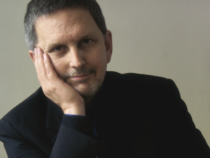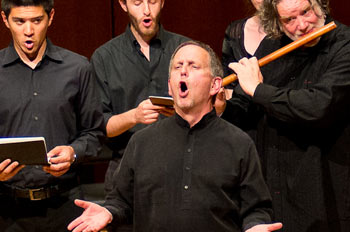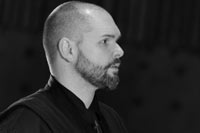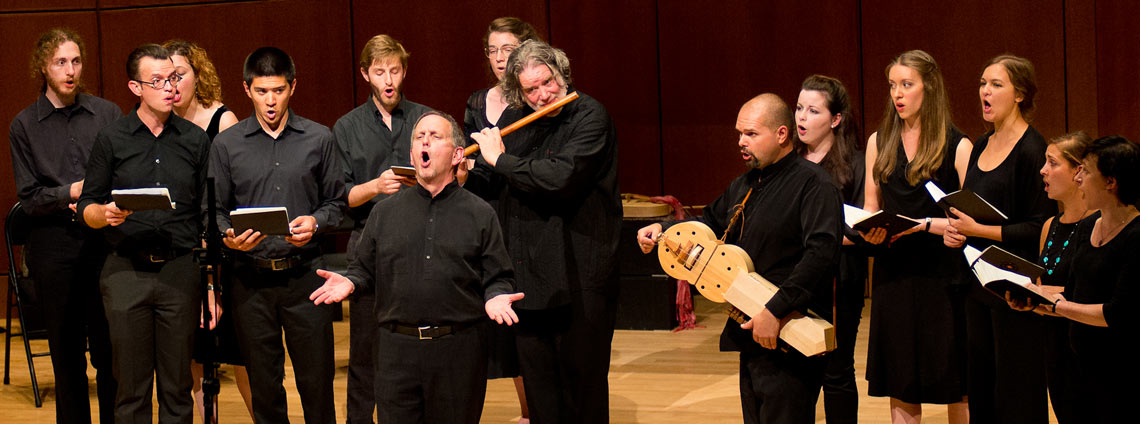Roy Barnett Recital Hall | Map
Sequentia; Benjamin Bagby, voice & harp; Sequentia: The Queen and the Troubadour, flutes; Wolodymyr Smishkewych, voice & organistrum
Pre-concert chat at 6:45 PM with Benjamin Bagby and Matthew White
With students from the Vancouver Early Music Summer Programme
Inspired by the stories of ‘courts of love’ presided over by twelfth-century noblewomen such as Eleanor of Aquitaine, this programme presents songs, stories and dances from the love-drenched world of the troubadours and minstrels of medieval Europe. Sequentia is joined on stage by a group of dynamic young professional singers and instrumentalists, participants in the legendary Vancouver summer course in medieval music.
Due to the unique nature of this venture, the exact programme will not be available until a few days before the performance. As soon as the final programme is determined it will be available here and as a programme insert at the concert itself. Translations of the sung texts will be provided in video projections.
Generously sponsored by Elaine Adair

Sequentia
Sequentia is among the world’s most respected and innovative ensembles for medieval music. Under the direction of Benjamin Bagby, Sequentia can look back on more than 40 years of international concert tours, a comprehensive discography of more than 30 recordings spanning the entire Middle Ages (including the complete works of Hildegard von Bingen), film and television productions of medieval music drama, and a new generation of young performers trained in professional courses given by members of the ensemble.
Sequentia, co-founded by Bagby and the late Barbara Thornton, has performed throughout Western and Eastern Europe, the Americas, India, the Middle East, East Asia, Africa and Australia, and has received numerous prizes (including a Disque d’Or, several Diapasons d’Or, two Edison Prizes, the Deutsche Schallplattenpreis and a Grammy nomination) for many of its thirty recordings on the BMG/Deutsche Harmonia Mundi (SONY), Raumklang, Glossa and Marc Aurel Edition labels. The most recent CD releases include reconstructions of music from lost oral traditions of the Middle Ages (The Lost Songs Project), including 9th and 10th century Germanic songs for the Apocalypse (Fragments for the End of Time), the ensemble’s acclaimed program of music from the Icelandic Edda: The Rheingold Curse, as well as the earliest-known European songs (Lost Songs of a Rhineland Harper), medieval liturgical chant (Chant Wars, a co-production with the Paris-based ensemble Dialogos), and most recently, Boethius: Songs of Consolation. Sequentia has created over 80 innovative concert programs which encompass the entire spectrum of medieval music, giving performances all over the world, in addition to their creation of music-theater projects such as Hildegard von Bingen’s Ordo Virtutum and the medieval Icelandic Edda. In 2017, Sequentia’s 30-year project to record the complete works of Hildegard von Bingen was released by SONY as a 9-CD box set. The work of the ensemble is divided between a small touring ensemble of vocal and instrumental soloists, and a larger ensemble of voices for special performance projects. Upcoming projects include a version of the 14th –century Roman de Fauvel, staged by Peter Sellars, and presented in co-production with the Metropolitan Museum/Cloisters (New York) and the Théâtre du Châtelet (Paris). After many years based in Cologne, Germany, Sequentia’s home was re-established in Paris in 2001.

Benjamin Bagby, voice & harp
Vocalist, harper and medievalist Benjamin Bagby has been an important figure in the field of medieval musical performance for over 40 years. Since 1977, when he and the late Barbara Thornton co-founded Sequentia, his time has been almost entirely devoted to the research, performance and recording work of the ensemble.
Apart from this, Mr. Bagby is deeply involved with the solo performance of Anglo-Saxon and Germanic oral poetry: his acclaimed performance of Beowulf has been heard worldwide and was released as a DVD in 2007. In 2017, he was awarded the Artist of the Year Award by REMA, the European Early Music Network. In addition to researching and creating over 75 programs for Sequentia, Mr. Bagby has published widely, writing about medieval performance practice; as a guest lecturer and professor, he has taught courses and workshops all over Europe and North America. Between 2005 and 2018 he taught medieval music performance practice at the Sorbonne – University of Paris. He currently teaches medieval music performance at the Folkwang University of the Arts in Essen, Germany.

Sequentia: The Queen and the Troubadour, flutes

Wolodymyr Smishkewych, voice & organistrum
Spanish-Ukrainian tenor Wolodymyr Smishkewych is a native of New Jersey, USA. He has specialized in medieval song, chant, and new music since the 1990s. He received his training in voice performance from Rutgers University (BM ‘95, MM ‘98) and Indiana University’s Jacobs School of Music (DM ‘13), having studied with renowned tenors Frederick Urrey, Paul Elliott and Alan Bennett. A sought-after performer and vocal pedagogue in medieval, contemporary, and world music, he has lectured and taught masterclasses and performance programs at universities in the United States, South America, Canada, and Europe.
In 2011, he joined the faculty of the Irish World Academy of Music and Dance at the University of Limerick, Ireland, where he was director of the MA in Ritual Song and Chant until 2014.
He is a member of Sequentia Ensemble for Medieval Music and of Paul Hillier’s Theatre of Voices, and has performed with The Harp Consort and Ars Nova Copenhagen. His opera appearances in the USA and Europe have been under the baton of directors such as Peter Sellars, Gary Wedow, Benton Hess, and James Middleton. He has performed at major festivals including BBC Proms, Tanglewood, Regensberg Tage Alter Musik, Festival Cervantino, Edinburgh Festival, and the early music festivals of Boston, Barcelona, Utrecht, and Berkeley. He has recorded for Sony/BMG, Harmonia Mundi USA, ExCathedra, and IU Music-Focus records, and written for publications by Cambridge University Press and Taunton Press.
Upcoming performances include performances of Frankish Phantoms with Sequentia Ensemble for Medieval Music at the 2015 Boston Early Music Festival, and Händel’s Messiah in Lausanne, Switzerland with Resurgam and the Irish Baroque Orchestra in November 2015. Wolodymyr Smishkewych gratefully acknowledges funding support from the Music Network Music Capital Scheme, funded by the Department of Arts, Heritage and the Gaeltacht (Arts Council Ireland).


